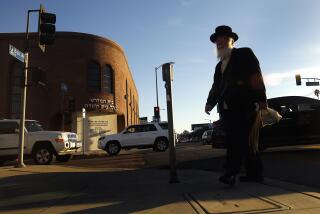Seder for Needy, Lonely Offers Passover Celebration for 500
- Share via
They began arriving 2 1/2 hours early, jostling for places in line, patiently submitting to careful searches of their handbags before walking through the metal detector at the entrance of the Jewish Community Building on Wilshire Boulevard.
In all, about 100 were turned away Sunday from this and three other locations in the Greater Los Angeles area. But about 500 got in, and for them it was a Passover seder--albeit two days late--that many would not have otherwise had.
“It means everything to me,” said Molly Drucker, 74, who said she had come by bus. “It’s very important to be with people. When you’re with people you feel like you are alive; otherwise you feel like nobody.”
Penny Margold, 41, an unemployed former medical office assistant who has lived alone and on state disability ever since an automobile accident seven years ago, said this was the only seder she had been invited to this year.
“I’ve never felt like I’ve been accepted by society since the accident,” she said. “This links me to a tradition that I would like to keep in touch with.”
It was the second annual seder meal for indigent, elderly, disabled and lonely Jews put on by Jewish Family Services of Los Angeles and the Southern California Council of B’nai B’rith.
Security was tight, organizers said, because of the recent events in Libya and the fear of terrorist attack. But that did not seem to dampen the participants’ enthusiasm for this traditional celebration of the Jews’ freedom from bondage in Egypt.
Economic Needs
This year’s seder, in fact, attracted more than twice as many as last year’s, a development Clarence Gerber, chairman of the Jewish Family Services Seder Committee, which organized the event, attributed to a sluggish economy and cuts in government services which he said are affecting Jews as well as the rest of society.
“People think of Jews as having money,” Gerber said, “but that’s a misconception.”
In addition to economic problems, he said, the Los Angeles Jewish community is being affected by the continuing arrival of Russian immigrants and, more recently, by Iranian Jews whose immigration, he said, has increased five-fold in the last year.
A recent survey by his organization, Gerber said, revealed that as many as 1,000 homeless Jews are wandering the streets of Los Angeles at any given time. And requests to Jewish Family Services for aid, he said, number about 3,000, up by about 700 compared to this time last year.
Reminder of Youth
Adele Landau, 76, said she attended Sunday’s seder because it reminded her of the seders of her youth in Russia. Until she emigrated to the United States 10 years ago, Landau said, she was able to participate in seders--which are illegal in Russia--only occasionally and in secret. “I’m here because I belong to the Jewish people,” Landau said. “It’s in me.”
That seemed to be the common feeling as participants listened to Rabbi Levi I. Galperin, a chaplain at St. Vincent Medical Center, explain the Passover tradition between group renditions of the “Star Spangled Banner” and the Israeli national anthem, “Hatikva.”
“We’re doing this to give them a lift,” Galperin said later. “One of the statements of the seder is for everyone who is needy to come.”
Many of the needy said they had been referred to the seder by social workers. For those too sick or too old to drive, volunteers provided transportation. And to prevent anyone from going away hungry, take-home “care packages”--containing such traditional Passover foods as matzo, green vegetables, horse radish and hard boiled eggs--were distributed.
“It brings back memories of my young years when I used to perform the seder with my children and husband,” Drucker recalled, misty-eyed. “Now I’m all alone.”
But she still has the bus, she said. And if she had not had this seder to come to, she knew exactly where she would be on this otherwise lonely sunny Sunday.
“I’d have gone to the beach,” Drucker said. “I’d be sitting there watching the water.”
More to Read
Sign up for Essential California
The most important California stories and recommendations in your inbox every morning.
You may occasionally receive promotional content from the Los Angeles Times.










